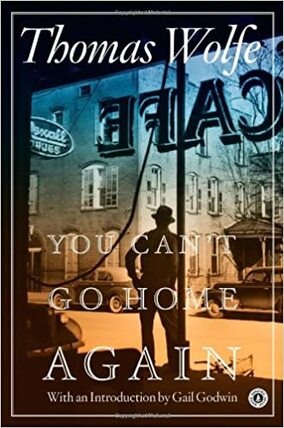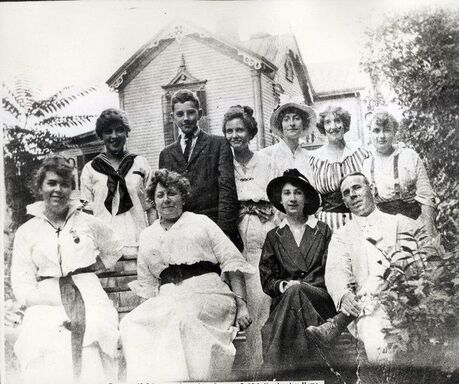 You Can’t Go Home Again is the last of Wolfe’s four autobiographical novels. It was written in 1934 but published posthumously in 1940. George Webber steps out into the world, the “web of mankind” that he speaks of, and experiences more than in The Web and the Rock. He is called home when his Aunt Maw dies. As discussed in the previous post, after George’s mother died, Aunt Maw was “the most solid and permanent fixture in his boy’s universe.” It is flashbacks involving Aunt Maw that remind me of my attraction to Wolfe’s writing—like my mother and me, continually reliving the past and the associated emotions as though they are happening in the present. To George, “…many things of no great importance in themselves had become deeply embedded in his memory….” Same with us. Wolfe relates some of his story to the 1929 stock market crash. He’d seen, especially in New York, how Americans wanted to remain comfortable in their shell. But once changes from within started, they couldn’t “go home again.” My mother was six years old when the crash occurred, about the time she nearly died of scarlet fever. It was also the year that Wolfe’s first successful novel was published. Few could accept the fact that nothing would ever be the same. As this novel begins, his first novel, Look Homeward Angel, has just been published to great dismay by those in his hometown and he worries about the reception he will encounter. You Can’t Go Home Again introduces vibrant, if often defective, characters both in Ashville and in Wolfe’s current life in New York City. He describes the racist, the unfair boss, the egotistical wealthy, and the “hangers-on” of the creative elite, among others. Negative portraits of Blacks, Jews, Irish, and homosexuals are attributed to these characters reflect Wolfe’s Southern background. Morton Teicher, the Wolfe scholar who provided the excellent Looking Homeward: A Thomas Wolfe Photo Album, describes Wolfe’s politics at the time as that of “a Southern populist with some remaining tinges of Southern conservativism.” More about that in future posts.  The Serenity Prayer The Serenity Prayer History Influences Plot Wolfe’s characters are influenced by history and current events. Two chapters are titled “The Anodyne” and “The Promise of America.” Anodyne refers to anything that relieves distress or pain, and he discusses the current state of America and the world and the future of Capitalism and Communism as he perceives them in 1934 leading up to World War II. He predicts correctly on many points. George arrives in London in the late summer of 1934. After completing his second book there he leaves for Germany in 1936. Later while on the train ride leaving Germany for Paris, he has a troubling personal experience with Nazism, which affects him greatly and leads him to despair over what Germany, a country he loves and identifies with, has become. Foxhall Edwards (based on Wolfe’s editor Maxwell Perkins) was more than his editor. He was like a second father that George needs, the “father of his spirit.” That’s why we’re surprised that he feels a need to leave Fox in the last chapters. Many of us have had mentors that, for one reason or another, we felt it was healthier to leave at some point. George explains to Fox in the last chapters of the book why the German incident and the consequences of the 1929 crash made him lose faith in man’s spirt. It is considered by many the best writing in the novel and is Biblical in style as George describes how he has been able to change his attitude. He has found that many things in life that never change (the title of a chapter in the novel) and ends with “Only the earth endures, but it endures forever” after alluding often to Ecclesiastes. He is finally able to reject what he calls Fox’s philosophy of hopeful fatalism which George defines as pessimistic. My mother and I also chose Ecclesiastes, especially the verses around “For everything there is a time and purpose under Heaven….” We also loved the Serenity Prayer, which reflects a similar philosophy.  Wolfe at home with family and friends pre-1920 Wolfe at home with family and friends pre-1920 Epilogue Wolfe hungered for fame, but after he achieved it, he didn’t want it: Why? Several reasons. First, for many years it alienated him in Ashville relationships. He also didn’t like the hangers-on and creative snobs that he increasingly encountered in New York. According to many, he also struggled all his life with the pressure to produce a second book that would be as successful as his first. After his visit home, George’s only remaining Ashville friend tries to make him realize that his constant need to perform—his obsession with writing—is because of the inner voice of his father. I felt the same about my mother—always feeling the need to please her and, in that way, help her to please her father. Her preoccupation with her father’s family was similar to that of Wolfe’s. I can empathize with George’s feelings about his first book and self-doubt about writing the next one, which raised Wolfe’s pessimism about life again. Whether it is a dissertation or a novel, as Wolfe says, you know that each step of the process leads to “unending labor and preparation” for the next step. It’s challenging for an author to identify a point marking the end of the process. Fortunately, Wolfe had Max Perkins for a mentor. Fortunately for me, I have an easier time than Wolfe in facing challenges and making decisions. At first, I assumed it was Old Catawba/Libya Hills/Ashville that he can’t return to. But later we understand that it is also the Germany that he loved, his former relationships, even to his publisher and friend Fox, and his old behaviors as he becomes more philosophically liberal. The last chapters in this novel are self-disclosures of new awareness about himself. Some felt that Wolfe changed publishers in part because reviewers at the time wrote that he was being directed too much by Max Perkins. As we find in the novel, the complete break in 1937 was also due to his concerns about Perkin’s conservative political views as Wolfe became increasingly liberal. Why do generations continue to return to Wolfe’s work? William Faulkner states it well. Wolfe “puts the whole history of the human heart on the head of a pin.” Wolfe himself said, “…Life—the only thing that matters. It is savage, cruel, kind, noble, passionate, generous, stupid, ugly, beautiful, painful, joyous—it is all these things and more—and it’s all these I want to know….” And human nature never changes. You can access all of Thomas Wolfe's novels via public domain through Project Gutenberg Australia. Here's the link to the first novel, You Can't Go Home Again, to get you started. Next time: Wolfe’s Diverse Artistry Ann Otto writes fiction and nonfiction and blogs on history and writing. Her historical novel, Yours in a Hurry about Ohioans relocating to California in the 1910’s, is based on fact and oral history and is available online at Amazon, Barnes & Noble, and Kindle. Her academic background is in history, English, and behavioral science, and she has published in academic and professional journals. She enjoys speaking with groups about all things history, writing, and the events, locations, and characters from Yours in a Hurry and her current projects, including research on Ohio’s Appalachia in the 1920’s and a compilation of her father’s World War II letters. Ann can be reached through the website, https://www.ann-otto.com/ , at Facebook@Annottoauthor and at www.Goodreads.com.
0 Comments
|
Archives
August 2020
Categories
All
|
 RSS Feed
RSS Feed